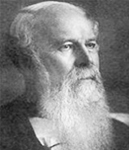 J.C. Ryle
J.C. Ryle
And the book of the prophet Isaiah was handed to Him. And He opened the book and found the place where it was written, “The Spirit of the Lord is upon Me, because He anointed Me to preach the gospel to the poor. He has sent Me to proclaim release to the captives, and recovery of sight to the blind, to set free those who are oppressed, to proclaim the favorable year of the Lord” (Lucas 4:17-22).
We may well believe that there was a deep meaning in our Lord’s selection of this special passage of Isaiah. He desired to impress on his Jewish hearers, the true character of the Messiah, whom He knew all Israel were then expecting. He well knew that they were looking for a mere temporal king, who would deliver them from Roman dominion, and make them once more first among the nations. Such expectations, He would have them understand, were premature and wrong. Messiah’s kingdom at his first coming was to be a spiritual kingdom over hearts. His victories were not to be over worldly enemies, but over sin. His redemption was not to be from the power of Rome, but from the power of the devil and the world. It was in this way, and in no other way at present, that they must expect to see the words of Isaiah fulfilled.
Let us take care that we know for ourselves in what light we ought chiefly to regard Christ. It is right and good to reverence Him as very God. It is well to know Him as Head over all things—the mighty Prophet,—the Judge of all,—the King of kings. But we must not rest here, if we hope to be saved. We must know Jesus as the Friend of the poor in spirit, the Physician of the diseased heart, the Deliverer of the soul in bondage. These are the principal offices He came on earth to fulfill. It is in this light we must learn to know Him, and to know Him by inward experience, as well as by the hearing of the ear. Without such knowledge we shall die in our sins.
We should observe what an instructive example we have in these verses of the manner in which religious teaching is often heard. We are told that when our Lord had finished His sermon at Nazareth, His hearers “bare Him witness, and wondered at the gracious words which proceeded out of His mouth.” They could not find any flaw in the exposition of Scripture they had heard. They could not deny the beauty of the well-chosen language to which they had listened. “Never man spake like this man.” But their hearts were utterly unmoved and unaffected. They were even full of envy and enmity against the Preacher. In short, there seems to have been no effect produced on them, except a little temporary feeling of admiration.
It is vain to conceal from ourselves that there are thousands of persons, in Christian churches, in little better state of mind than our Lord’s hearers at Nazareth. There are thousands who listen regularly to the preaching of the Gospel, and admire it while they listen. They do not dispute the truth of what they hear. They even feel a kind of intellectual pleasure in hearing a good and powerful sermon. But their religion never goes beyond this point. Their sermon-hearing does not prevent them living a life of thoughtlessness, worldliness, and sin.
